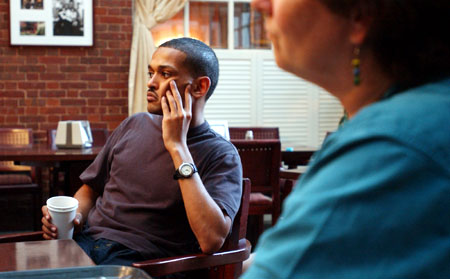Harvard’s Muslims grieving, wary
Backlash causes concern but no serious incidents

When Saif Shah Mohammed came to Harvard as a freshman three years ago, it was the first time he had been in the United States. A native of Bangladesh who grew up in Kuwait, now a senior concentrating in economics, Shah Mohammed says that living in America has affected him profoundly.
“I’ve come to love America in the last three years,” he said. “I’ve come to love the people, I’ve come to identify with this place. When people here grieve, I grieve.”
But on Sept. 11, when terrorists attacked the World Trade Center and the Pentagon, Shah Mohammed found himself in a difficult position.
“As one of my friends said, we’re having to grieve, but we’re also having to look over our shoulders.”
The reason for this fear is the backlash against Muslims and people of Middle Eastern background that has occurred all over the country in the wake of the attacks and the identification of Saudi terrorist leader Osama bin Laden as the prime suspect.
Shah Mohammed, who is president of the Harvard Islamic Society, is distressed by reports of hate crimes against Muslims, as he is by statements implying that terrorism is somehow sanctioned or inspired by the Muslim religion.
“There is absolutely nothing in the Islamic tradition that supports what has happened. In Islam, attacking innocent people is forbidden. Human life is considered sacred.”
According to David Illingworth, associate dean of Harvard College, there have been no hate crimes on campus directed at Middle Eastern students.
“That makes me very happy. It’s something for the Harvard community to be proud of,” Illingworth said.
Nevertheless, the College is not taking student safety for granted. Illingworth has met with members of the Harvard Islamic Society to reassure Islamic students that they have the full support of the administration.
“The police department has been alerted,” he said. “Any student who is threatened should report the incident to the police. The Harvard police have a good relationship with the students, and I think students will feel free to approach them if they should encounter any problems.”
In fact, the Harvard University Police Department (HUPD) confirms the reporting of numerous angry e-mails as well as a variety of telephone conversations of a similar tone. According to HUPD Chief Francis Riley, each incident has been investigated and, to date, none has risen to the level of criminality.
Students who are apprehensive about walking alone, especially at night, can call the shuttle van service at (617) 495-0400 for door-to-door service. The Harvard Police Department, in collaboration with the office of the Dean of Students, provides an escort service for routes not covered by the shuttle van.
Many Muslims at Harvard, while they were horrified by the events of Sept. 11 and deplore the incidents of hate that have occurred in their wake, nevertheless see this time as an opportunity for educating people about Islam.
“We want to encourage people to get to know us,” said Melinda Krokus Mott, a graduate student at the Divinity School and a convert to Islam. “As Muslims, we believe that everything comes from Allah. We are being put in the center of all this as an opportunity to show what we’re about.”
Mott suggests that people come to Muslim religious services held every Friday at 1:15 p.m. in Lowell Lecture Hall.
“Show solidarity with us. Come and see what we do when we pray. Don’t be afraid to ask questions. Ignorance can be really destructive.”
One of Mott’s concerns is the way the media portrays Islam as something strange and foreign. While it is true that many members of the Muslim community in America are foreign-born, it is also true that there are large numbers of American-born Muslims.
“Islam in America is an established religion. It’s not a new thing. We are your doctors and lawyers and insurance agents. We are all over,” she said.
David Mitten, the James Loeb Professor of Classical Art and Archaeology, agrees that the present time is an opportunity for American Muslims to make their religion better known. Mitten, who converted to Islam in the late 1960s while working at Harvard’s archaeological excavation in Sardis, Turkey, serves as a faculty adviser to the Harvard Islamic Society.
“The level of understanding of Islam is abysmally low in this country, even among educated people,” he said. “Muslims see in this crisis an opportunity to speak out and show what their faith really is, that it’s compatible with the pluralistic and free society of the United States.”
According to Mitten, the concept of jihad, or holy war, which has been evoked by Muslim militants as a justification for violent acts, is an outmoded concept which has no place in the central doctrines of present day Islam.
“True jihad is the constant struggle of Muslims to conquer their inner base instincts, to follow the path to God, and to do good in society. Muslims believe that to take one life is like killing all of humanity.”
Contact Ken Gewertz at ken_gewertz@harvard.edu




